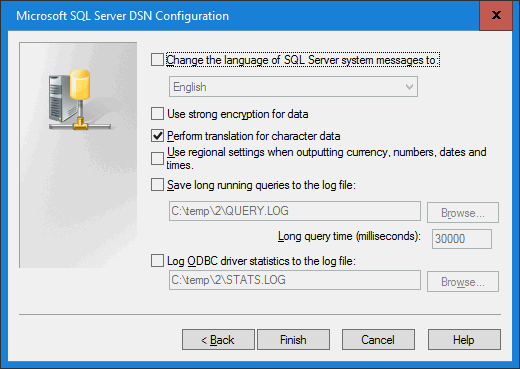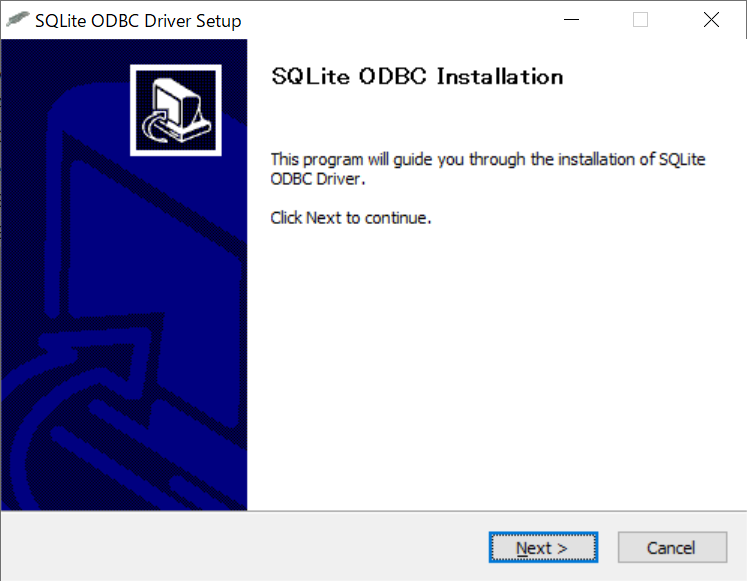

For example, the Monitoring Service and Storage Management system can use s a SQLite databases. Many applications, including Exago, use SQLite in order to store local data. SQLite is a relational database system which stores data directly in local disk files. To add a SQLite Data Source in these versions, skip this topic and follow the instructions in Data Sources exclusively. When everything is over, created binaries will be in the bin folder next to the downloaded files.Beginning with v2021.1.8+, native ADO.NET support for SQLite is included.
#SQLITE3 ODBC DOWNLOAD#
To build the SQLiteODBC, download all five files from the repo (Makefile.mingw, insta.c, mingw-build.sh, minshell.c, sqliteodbc_w32w64.nsi) and execute the bash script (mingw-build.sh) from a MinGW shell. sqliteodbc_w32w64.nsi is a simplified NSIS script for building an NSIS installer (compatible with both x32 and 圆4 variants). insta.c is a modified version of inst.c, which copies provided libraries instead of SQLite extensions.
#SQLITE3 ODBC DRIVER#
Then this Makefile uses this custom amalgamation to build the SQLite3 ODBC driver and NSIS installer. The Makefile recursively calls SQLite’s Makefile generating a standard SQLite amalgamation and includes libshell.c. It also includes a logging facility showing the actual build command-line options.
#SQLITE3 ODBC CODE#
“Makefile.mingw” is adapted from Makefile.mingw-cross, mostly keeping the code relevant for the SQLite3 ODBC driver. Mingw-build.sh downloads SQLiteODBC sources and the current SQLite source tarball, unpacks them, runs configure, sets ICU-related flags, copies necessary libraries, and runs Makefile.mingw Makefile. All other driver variants, extensions, and build options/variations are not supported. They incorporate code to build the ODBC driver with embedded SQLite3 library and an NSIS installer only (x32 or 圆4 based on the active toolchain). These scripts, mingw-build.sh and Makefile.mingw, control the build process. I decided to create two simplified scripts (available from this repository). To enable SQLite extensions, however, compile options also need to be adjusted. Such a custom amalgamation can be prepared from the current stock amalgamation and the shell.c file, and one code line is sufficient to inject it into the existing building process. This additional file is a patched version of shell.c, having one function renamed to avoid naming collision and renamed entry point.

This script performs a fair amount of SQLite source code patching and creates a custom SQLite amalgamation with one additional file embedded, which is the only required modification. To use the current SQLite library with all its extensions, however, further adjustments were necessary.Īn up-to-date amalgamation file can be injected via the shell script mingw-cross-build_d.sh (the original version is included with the driver). After fixing the URL and removing prefixes and cross-compilation options, I could build the driver. The make scripts include hard-coded absolute paths not matching MSYS directory structure, and under MSYS, native MinGW toolchains are preferable for producing x32 and 圆4 builds. The zlib source URL included in the shell scripts is outdated.

Under MSYS/MinGW environment, these scripts do not work as is due to several issues. The SQLite ODBC driver source includes shell and associated GNU make scripts for automated building (mingw(64)-cross-build.sh and *.mingw(64)-cross).


 0 kommentar(er)
0 kommentar(er)
